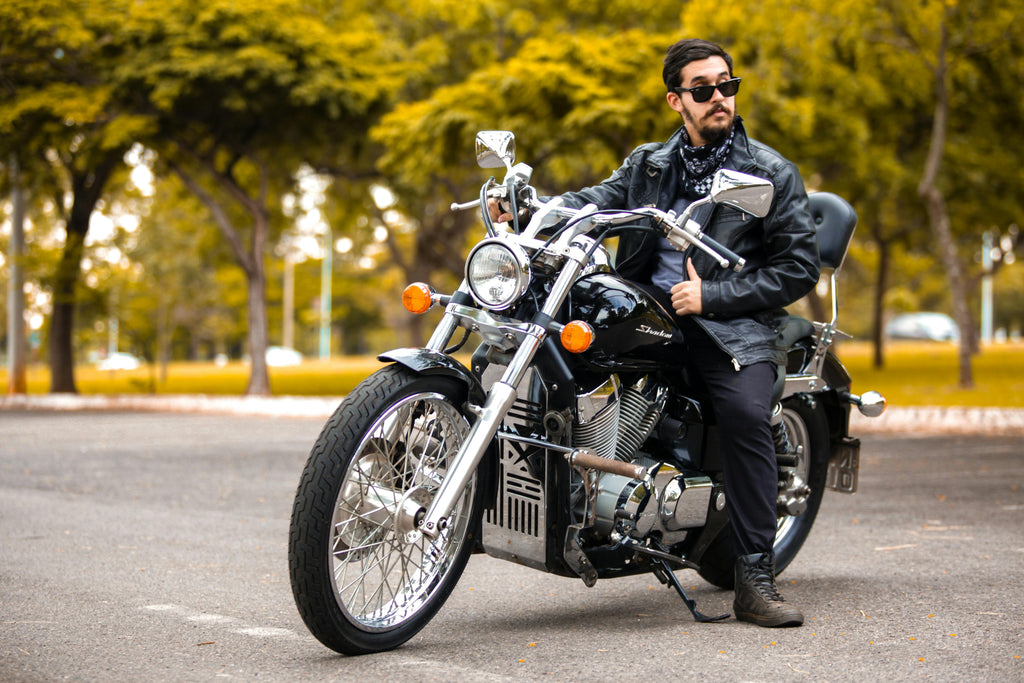Vegan Leather Motorcycle Gloves
Posted by HASSAN KHAN

Exploring the Viability of Vegan Leather Motorcycle Gloves
In the dynamic world of fashion and sustainability, the quest for alternative materials has gained significant traction. One such material that's been in the spotlight is vegan leather. While traditionally associated with fashion accessories, its application in motorcycle gloves raises intriguing questions. Let's delve into the debate surrounding the viability of vegan leather motorcycle gloves.
Introduction: Fashion, Sustainability, and Vegan Leather
On one hand, proponents of vegan leather emphasize its cruelty-free nature. Transitioning away from animal-derived products aligns with ethical and environmental concerns, appealing to consumers with a conscience. Advancements in technology have led to the development of high-quality vegan leather that closely mimics the texture and durability of genuine leather. This not only satisfies the aesthetic preferences of consumers but also ensures functionality and longevity.
In the dynamic intersection of fashion and sustainability, the exploration of alternative materials has become paramount. Among these materials, vegan leather has emerged as a notable contender. While traditionally associated with fashion accessories, its potential application in motorcycle gloves has sparked intriguing discussions within the industry. This article explores the debate on using vegan leather in motorcycle gloves, considering diverse perspectives and arguments for and against it.
Proponents' Perspective: Ethical and Environmental Benefits of Vegan Leather
However, critics raise valid concerns regarding the performance of vegan leather in motorcycle gloves. Unlike traditional leather, which boasts natural strength and abrasion resistance, some argue that vegan leather may fall short in durability under rigorous conditions. Technological advancements have created vegan leather resembling genuine leather, meeting aesthetic preferences and ensuring functionality and longevity. This makes it appealing for ethical and eco-conscious consumers.
Advancements in Technology: Enhancing Vegan Leather Quality
Moreover, there's a debate surrounding the environmental impact of vegan leather production. While it eliminates the use of animal products, the manufacturing processes of synthetic materials often involve chemicals and petroleum-based substances, raising questions about sustainability. Additionally, the longevity and recyclability of vegan leather remain under scrutiny compared to genuine leather.
The evolution of technology has played a pivotal role in enhancing the quality of vegan leather.
Manufacturers have developed vegan leather that matches traditional leather properties through innovative manufacturing and material engineering. High-quality vegan leather is now durable, flexible, and resistant, making it suitable for various applications, including motorcycle gloves. This technological advancement has boosted vegan leather's acceptance in the fashion industry, allowing its integration into specialized products.
Criticisms and Concerns: Durability Challenges of Vegan Leather in Motorcycle Gloves
Advocates assert that vegan leather's environmental footprint is lower than animal-derived leather, citing reduced land use and emissions. They emphasize factors like water consumption and greenhouse gases from livestock farming.
Furthermore, ongoing research and innovation in sustainable materials hold promise for improving the eco-friendliness of vegan leather.
Despite technological progress, critics express doubts about vegan leather's durability in motorcycle gloves. Unlike traditional leather, vegan alternatives may lack strength. Some argue they might not withstand rigorous conditions.
The rigidity required for motorcycle gloves to provide adequate protection poses a significant challenge for synthetic materials to match.
Motorcycle gear requires robustness for rider safety, making vegan leather durability a contentious issue among skeptics. They question its reliability.
Environmental Impact: Debating the Sustainability of Vegan Leather Production
Transitioning to a more positive outlook, the fashion industry's growing interest in sustainable alternatives presents opportunities for innovation and collaboration. Brands and manufacturers are increasingly investing in research and development to enhance the performance and eco-credentials of vegan leather. Collaborations between fashion designers, material scientists, and environmental experts could lead to breakthroughs in creating motorcycle gloves that seamlessly marry style, functionality, and sustainability.
While vegan leather eliminates the use of animal products, questions arise concerning its environmental impact, especially in terms of production processes. The manufacturing of synthetic materials often involves the use of chemicals and petroleum-based substances, raising concerns about sustainability and ecological harm. Additionally, vegan leather's longevity and recyclability are subject to scrutiny compared to genuine leather. Critics argue that the environmental benefits of vegan leather may be overshadowed by its reliance on non-renewable resources and the potential for pollution associated with its production.
Opportunities for Collaboration: Fashion Industry's Shift Toward Sustainability
The fashion industry's growing interest in sustainability presents opportunities for collaboration and innovation. Brands and manufacturers are increasingly investing in research and development to improve the performance and eco-credentials of vegan leather. Collaborative initiatives between stakeholders across the supply chain can accelerate progress towards creating motorcycle gloves that marry style, functionality, and sustainability seamlessly. By leveraging collective expertise and resources, the industry can drive positive change and shape a more sustainable future for fashion and consumer goods.
Conclusion:
The debate over the viability of vegan leather motorcycle gloves reflects broader discussions within the fashion and sustainability realms. While ethical considerations and technological advancements bolster the case for vegan leather, challenges such as durability and environmental impact warrant careful consideration. As the industry continues to evolve, collaborative efforts and advancements in materials science offer hope for a future where fashion meets function without compromising on ethics or quality. By embracing innovation and fostering collaboration, stakeholders can pave the way for a more sustainable and ethical fashion industry.



